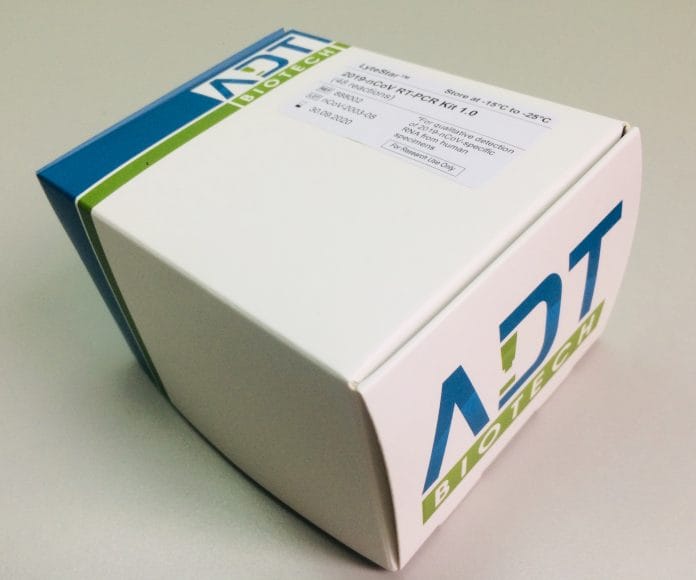KUALA LUMPUR: A Malaysian BioNexus Status company, ADT Biotech Sdn Bhd (ADT), has gained approval from Indian regulatory authorities for its Covid-19 test kit after successful validation.
ADT’s LyteStar 2019-nCoV RT-PCR Kit was validated by the Indian Council of Medical Research (ICMR), the Central Drugs Standard Control Organisation (CDSCO) under Directorate General of Health Services and the Ministry of Health & Family Welfare, India.
The approval was issued to ADT India, the local subsidiary of Malaysia’s ADT Biotech – an ISO 13485 certified company.
The approval also grants ADT India an import license for the Malaysian made test kits – which have since been included in the ICMR list of validated and approved detection kits of SARS-CoV-2, the virus causing COVID-19.
In line with WHO guidelines, the LyteStar 2019-nCoV RT-PCR Kit adopts a dual target strategy, targeting the E-gene of SARS-related Coronaviruses for the broader screening assay and the RdRP-gene for the SARS-CoV-2 (earlier referred to as 2019-nCoV) specific confirmation test. The screening assay is also separately available as the LyteStar SARS-CoV-2 RT-PCR Kit S (Screen) for flexible testing algorithms and best utilization of reagents and resources.
ADT Biotech, a BioNexus Status company under Malaysian Bioeconomy Development Corporation (Bioeconomy Corporation), developed the test specifically for the need of having an easy-to-use and sensitive first-line screening assay for the routine diagnostic laboratory, followed by a highly specific confirmation test.
The test had already achieved recognition in Malaysia after the Ministry of Health (MOH) Malaysia has awarded ADT Biotech to supply its LyteStar 2019-nCoV RT-PCR Kit to all centers under MOH jurisdiction authorized to test for SARS-CoV-2, the virus causing COVID-19. Preceding the award, the LyteStar 2019-nCoV RT-PCR Kit had been validated by the Institute for Medical Research (IMR) with concordant results against IMR’s reference test.
Dr Finn Zedler, Managing Director of ADT Biotech commented: “ADT Biotech has been incorporated 10 years ago with the vision of improving the standard of diagnostic tests in the Asia Pacific region through advanced technologies and innovative products and has always had a strong commitment to expertise and quality.
“We are satisfied the quality of our products is recognized and we remain strongly committed to bring value to our customers and partners across the region”.
Zedler added that part of this achievement was due to the various forms of support and assistance given by Bioeconomy Corporation, especially in terms of engaging with relevant parties to market the LyteStar 2019-nCoV RT-PCR Kit and other ADT products in Malaysia and regionally. Mohd Khairul Fidzal Abdul Razak, Acting Chief Executive Officer of Bioeconomy Corporation said: “Bioeconomy Corporation is very pleased to see that a local BioNexus Status company like ADT Biotech is enhancing the capacity for COVID-19 testing to ultimately prevent the spread of the infection.
“The fact that the LyteStar 2019-nCoV RT-PCR Kit has received regulatory approval not only in Malaysia but also in India is a testament to the international recognition and trust given to the product in diagnosing COVID-19 patients. Bioeconomy Corporation will continue to support ADT Biotech and other BioNexus Status companies that are playing their part in developing products and services that can benefit the local and global community, as aligned with the ‘Going Global’ mandate of the National Biotechnology Policy’s (NBP) third phase in Malaysia.”
Following ADT’s approach of utilizing a low complexity screening assay, large numbers of cases can be screened with a comparatively simple test procedure and only patients tested positive with the 1st-line screening assay will be followed up and results confirmed with a second confirmative test. To date the test is utilized routinely in Malaysia, Thailand and Pakistan, and products have been shipped to India, Korea, Sri Lanka and Iran.
The Technology utilized for the test is based on the specific detection of gene sequences unique to the target pathogen. These gene sequences are amplified in a process referred to as real-time PCR (Polymerase Chain Reaction) and detected by the use of complementary molecular probes labelled with fluorescent markers.










